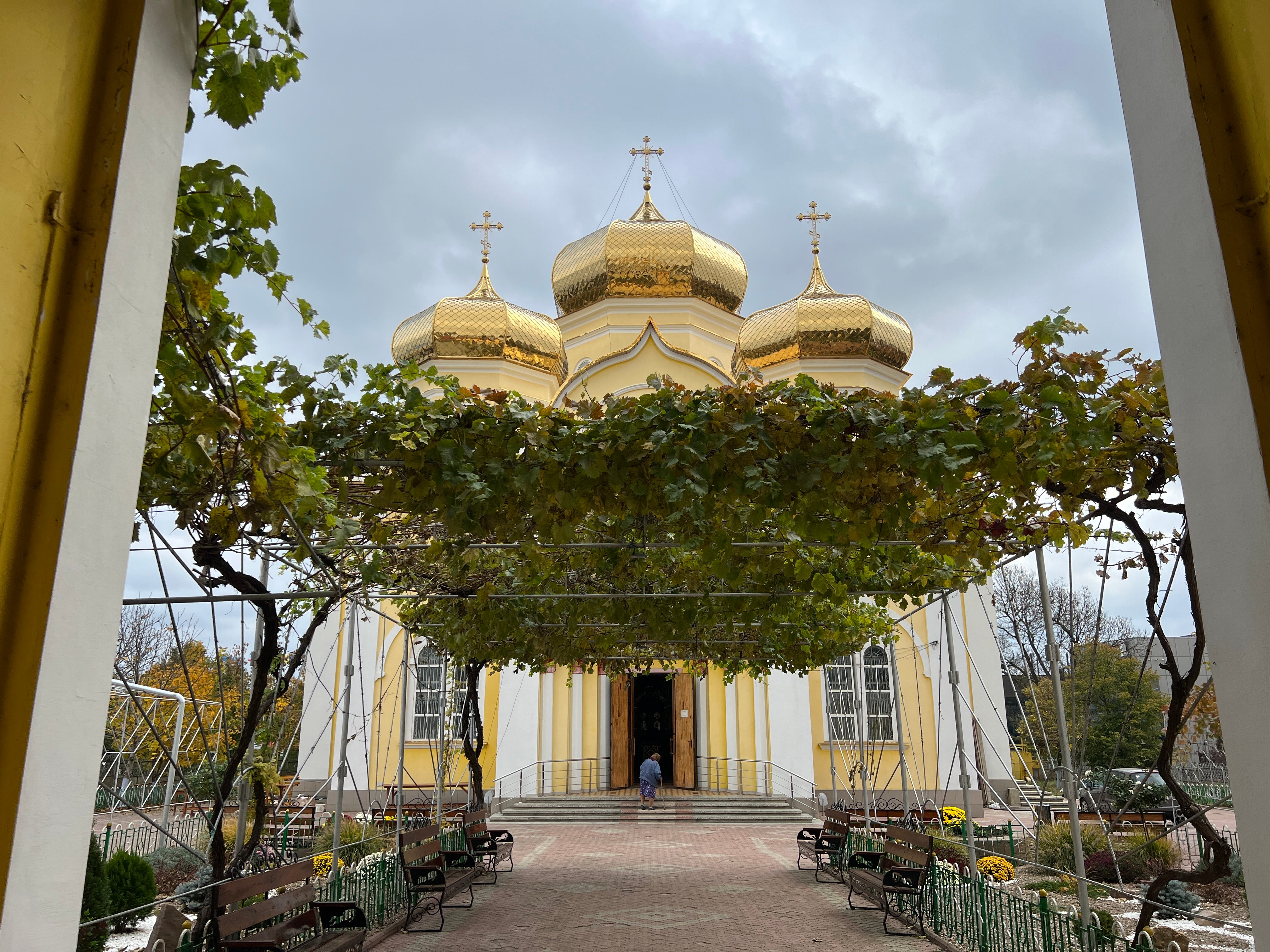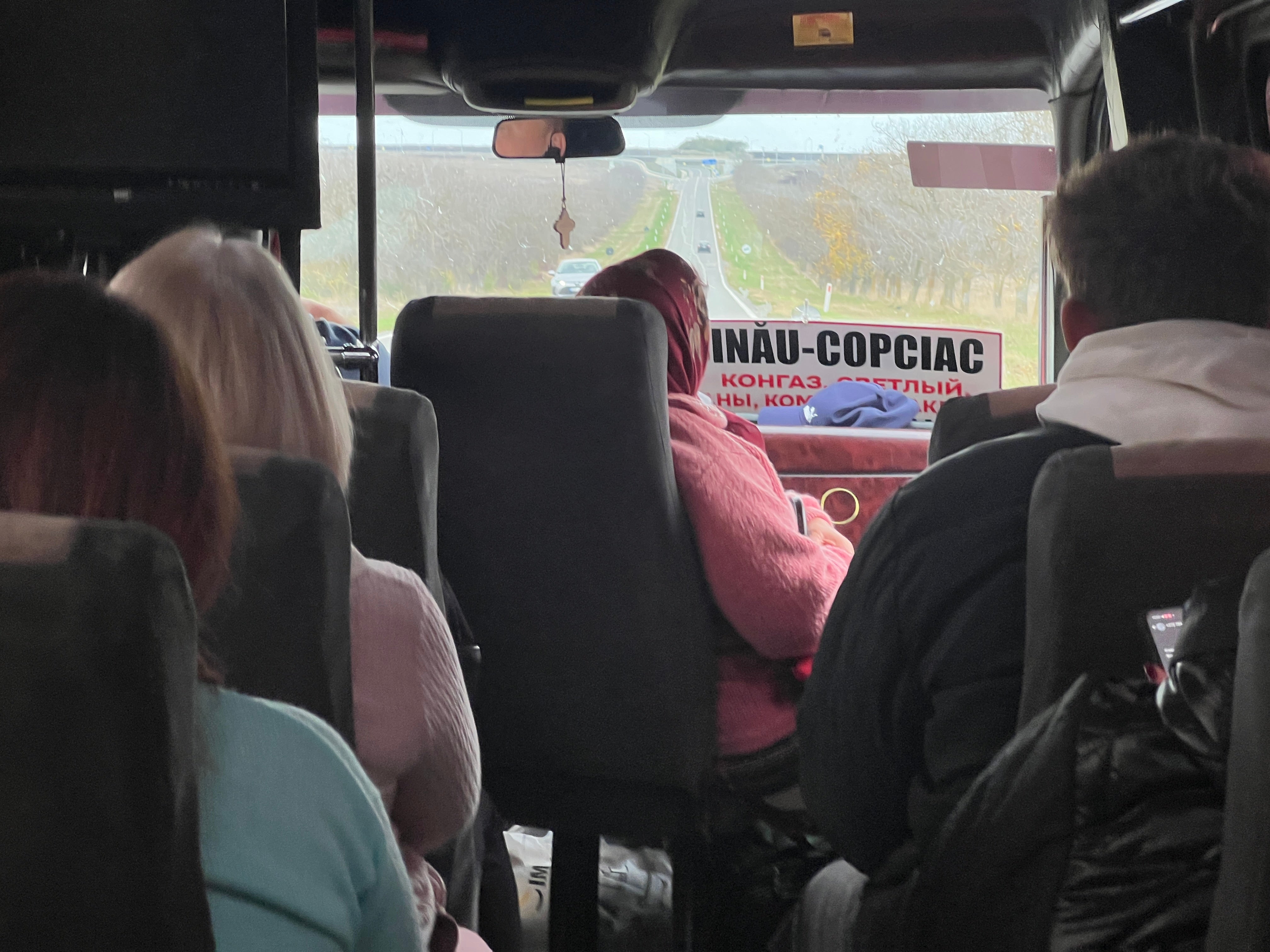The Danube mist was so thick I could hardly see the dawn. On Friday I woke up in a cheap hotel in the Romanian city of Galati, close to the point where the nation meets both Ukraine and Moldova. I was heading for the latter – specifically on the 8am bus to the city of Comrat, capital of the strange Autonomous Territorial Unit of Gagauzia. After seeing the sights and a spot of lunch, I would continue to the national capital of Chisinau on the 1.05pm bus in good time for some exploration. What could possibly go wrong – and right? I was about to find out.
8am: The sole Mir Trans Express departure of the day to Comrat is due to leave from an implausible location: on a suburban street just past a student pub named Student Pub, with no evidence whatsoever that this is an international departure point. I arrive in good time, since any alternative to the bus is guaranteed to be expensive and awkward. I have no actual ticket, just a reservation. Furthermore, I have neither Romanian nor Moldovan currency: just two €50 notes.
8.25am: Had the express bus glided through the fog without my noticing? The two other people who were waiting for it look increasingly despondent. Just as I am running through a possible alternative of a shared taxi to the border, a walk across no man’s land and the hope of finding some kind of transport on the other side, the express turns up with a handful of other passengers already on board.
I had been half-hoping for a proper, 50-seater coach. But no: it is a marshrutka. These are the beefy minibuses fitted with 20 seats, including a funny fold-down one right next to the driver, that serve as public transport across much of eastern Europe. The ceiling is carpeted, the legroom is minimal.
8.30am: The driver has one phone on the dashboard to guide him, and another in his left hand. As he steers through the mist, he calls out the names of passengers. Both he and I are surprised that I am not on the list, and he asks for my phone so he can check the reservation. In a feat of multitasking, he keeps driving while using his phone to take a picture of my phone. Then he spots a police car, and allows the bus to steer itself while he puts on his seatbelt as the law requires. Health and safety gone mad.
8.40am: With the help of the other passengers, the driver communicates the fact that he needs 400 Moldovan lei from me. I reply that while I would love to oblige, I have only euros. Had I not made the schoolboy error of carrying only large-denomination notes, he would have taken €20 there and then. We agree to postpone the problem.
9.15am: At the border. We are exiting Romania, the European Union and the wider Schengen area. The entry-exit system is definitely not in operation, but by next April, the border guards will need to collect biometrics from departing travellers.
9.30am: After the drive across a no-man’s-bridge, check-in to Moldova takes a further 15 minutes. Once through, I notice the roads are a lot more lumpy and bumpy. We stop at the first village for a smoke break.
10.30am: The mist has melted away to reveal the brilliance of a Moldovan autumn. We rumble through forests and vineyards turned to gold by the southeast European summer.
11am: The driver stops at a set of traffic lights in the middle of Comrat, causing traffic chaos while I sprint to a bureau de change and back. He does not seem sad to see me leave.
Comrat has an unusual population: Turkic people who speak Russian and are Orthodox Christians. I visit St John’s Cathedral, whose silver domes survived through the Soviet era, and lunch splendidly on sausage, egg, avocado and tomato at Pronto (slogan, “All your favourites in one place”).

1pm: The town’s bus station, labelled “Moderne”, is decked with ads explaining (in Russian) how much one can earn in a month by working in Europe. The top three salaries quoted are Germany (€1,800 ), Ireland (€1,900) and France (€2,000). I invest the equivalent of £3 in a ticket for the bus due to leave for Chisinau five minutes later. A marshrutka draws up. I show my ticket to the driver and step aboard.
1.30pm: The bus sets off. By now a total of 29 passengers are on board, and I am glad to have a seat. But not for long. It is heading away from the capital. I establish I am on the wrong vehicle. Someone yells at the driver to stop. I fight my way through the crowd and off the bus. “Half-past three,” says the driver as I leave – the time for the next departure, apparently.
1.45pm: Just as I arrive, on foot, back at the bus station, another minibus draws up – with “Chisinau” clearly announced as its destination. The driver takes one look at my ticket and indicates it is for a different company. He then marches to the ticket desk and demands I get a refund so I can pay him instead. “All sales are final” was the nature of the response. He then invites me to board the bus for the 90-minute ride to the capital anyway, batting away my attempt to pay.
The payload (and freeload) is less than the number of seats, the scenery glorious, and my mood buoyant at the prospect of reaching the bus station in the centre of Chisinau.

3.20pm: The journey ends abruptly at the Autogara Sud (south bus station) about five miles short of downtown. The driver poses for a selfie with me. Then I try to work out how to reach my target. The only road from the bus station is one way, in the wrong direction. A passerby, Lauren, takes me under his wing. “I could tell you were a foreigner and needed help because of your watch,” he explains. “In Moldova, no grown-up would ever wear an Apple watch.” He guides me through an alleyway and down an underpass that leads to the other side of a highway, explaining that I need trolleybus 9.
3.40pm: The number 9 is impossibly crowded. I board without knowing whether I need a pre-paid ticket or an app to ride. On a vehicle with perhaps 100 passengers, a conductor battles her way through the throng to reach me. Would she take my cash? Yes, indeed, that will be 6 lei (£0.27).
4pm: I step off beside the gently decaying Hotel Chisinau, a Soviet leftover where €45 buys you a “standart bed” plus a “bathroom with necessary sanitary ware”. Lenin still has a memorial on public display in the capital.
After eight hours on (and off) the road, I have been reminded that people are kind to strangers and that, far more often than not, a tricky journey can be a joy. And rather less profoundly, I learnt that my trolleybus fare to Chisinau airport for my flight home on Sunday evening will be the cheapest airport link in Europe.




0 Comments